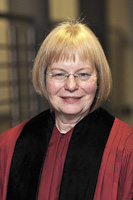Prof. Cynthia Miller-Naudé delivers inaugural lecture at the university
 |
Prof. Cynthia L Miller-Naudé
5 July 2012 |
Prof. Cynthia L Miller-Naudé recently delivered her inaugural lecture as senior professor at the University of the Free State.
The lecture also served as the opening key note address to the joint conference of the Linguistics Society of South Africa, the South African Applied Linguistics Association and the South African Association for Language Teaching.
In her lecture, Prof. Miller-Naudé focused on The Case of Ellipsis in Biblical Hebrew. She examined the interrelationship between poetic style and the grammatical rules of a language by describing the ways in which grammatical rules may be relaxed or even broken to achieve a particular style within poetry. She illustrated her lecture with examples from Biblical Hebrew, the language of the Hebrew Bible (Old Testament).
In Biblical Hebrew, it is very common to find ellipsis (words that are missing) in poetry, but they are always “missing” in ways that create stylistic effects. Prof. Miller-Naudé concluded her lecture by demonstrating that the stylistic effects of ellipsis can be described and explained using the theoretical model of cognitive poetics.
Prof. Miller-Naude was born and educated in the United States and is a leading authority in the fields of Biblical Hebrew linguistics and Bible translation.